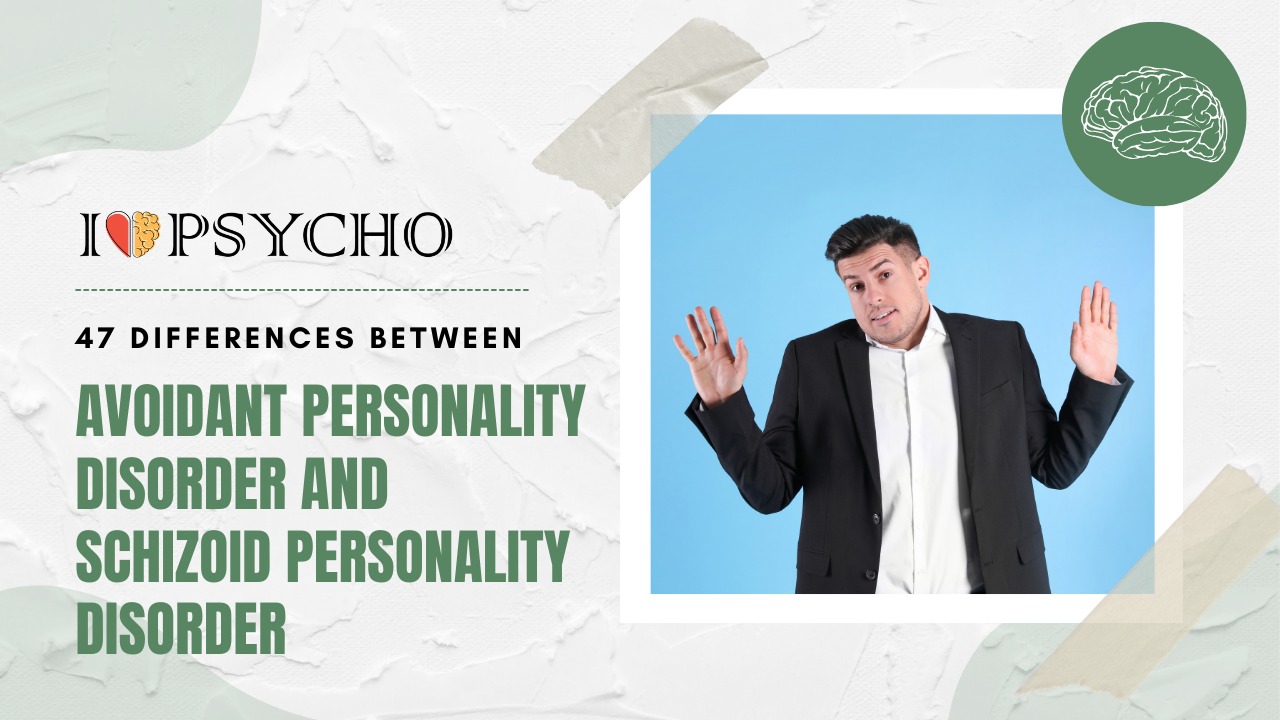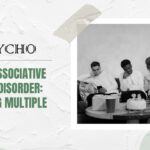Psychological disorders like Avoidant Personality Disorder (AvPD) and Schizoid Personality Disorder (SPD) are included within the cluster of personality disorders in the DSM-5. They have significant disparities despite their social isolation and interpersonal issues. APD is characterized by persistent feelings of inadequacy, hypersensitivity to criticism, and extreme fear of rejection. Social engagement is difficult for AvPD sufferers because they fear being judged or rejected. They lack self-confidence and seek constant reinforcement. This disease severely hinders their capacity to develop meaningful connections, socialize, and succeed in school and work.
Schizoid Personality Disorder, on the other hand, exhibits social withdrawal and restricted emotional expressiveness. SPDers seek alone and don’t like tight relationships. SPD people find social contacts unattractive or unimportant, unlike AvPD patients. Introspective, emotionally aloof, and preoccupied, they often appear. SPD sufferers’ separation is not caused by worry or fear but by their nature.
People with AvPD are more sensitive to criticism and rejection, whereas those with SPD have flattened emotional reactions and restricted emotional expressiveness. Motivations and attitudes toward social engagement distinguish the two. SPD people are pleased with their solitary existence, whereas AvPD people want social engagement but avoid it because they fear unfavorable judgment.
These illnesses have different treatments. Therapy for cognitive distortions and social skills impairments typically helps avoidant personality disorder. Cognitive Behavioral treatment (CBT) and exposure treatment can help people overcome their anxieties. Schizoid Personality Disorder therapy may focus on understanding emotions and motives, social skills, and communication, even if the patient has little desire for personal connections.
Finally, while Avoidant Personality Disorder and Schizoid Personality Disorder both include social isolation and interpersonal obstacles, their reasons and emotional experiences differ. SPDs are distant and disinterested in deep connections, whereas AvPDs dread rejection and unfavorable assessment. Accurate diagnosis and treatment planning need to recognize these distinctions.
Here are 47 differences between Avoidant Personality Disorder and Schizoid Personality Disorder:
|
S.No. |
Aspects |
Avoidant Personality Disorder |
Schizoid Personality Disorder |
|
1 |
Definition |
Avoidant Personality Disorder is characterized by an intense fear of rejection, criticism, or disapproval, leading to avoidance of social situations and interpersonal relationships. |
Schizoid Personality Disorder involves a pervasive pattern of detachment from social relationships and limited emotional expression. |
|
2 |
Social Interaction |
Individuals with Avoidant Personality Disorder desire social interaction but avoid it due to fear, leading to isolation. |
Those with Schizoid Personality Disorder have little desire for close relationships and prefer solitude. |
|
3 |
Loneliness |
People with Avoidant Personality Disorder often experience loneliness and a strong desire for social connection. |
Individuals with Schizoid Personality Disorder are typically comfortable with their solitary lifestyle and do not experience loneliness in the same way. |
|
4 |
Emotional Expression |
Avoidant individuals may express emotions but fear doing so in social situations. |
Schizoid individuals often have restricted emotional expression, both in social and non-social settings. |
|
5 |
Social Anxiety |
Avoidant Personality Disorder is closely associated with social anxiety and a fear of negative evaluation. |
Schizoid Personality Disorder is not necessarily linked to social anxiety but rather reflects a disinterest in social interactions. |
|
6 |
Desire for Relationships |
Those with Avoidant Personality Disorder desire close relationships but are often unable to form them due to fear. |
People with Schizoid Personality Disorder generally have little desire for close relationships and may not seek them out. |
|
7 |
Fear of Rejection |
Avoidant individuals fear rejection and criticism, which leads to avoidance behaviors. |
Schizoid individuals do not necessarily fear rejection but have little interest in social interactions to begin with. |
|
8 |
Social Avoidance |
Avoidant individuals avoid social situations, including parties, gatherings, and work-related events, due to fear of judgment. |
Schizoid individuals may also avoid social events but do so because they find little enjoyment or interest in them. |
|
9 |
Isolation |
Avoidant individuals often experience social isolation, even though they desire social connection. |
Schizoid individuals may prefer isolation and find it more comfortable. |
|
10 |
Emotional Vulnerability |
Individuals with Avoidant Personality Disorder may feel emotionally vulnerable in social situations. |
People with Schizoid Personality Disorder are less likely to experience emotional vulnerability in social or interpersonal contexts. |
|
11 |
Intimacy |
Avoidant individuals desire intimacy but often struggle to establish it due to their fear of being hurt. |
Schizoid individuals typically have little interest in intimacy and may be emotionally distant in close relationships. |
|
12 |
Coping Mechanisms |
Avoidant individuals may use avoidance, self-criticism, or rumination as coping mechanisms in social situations. |
Schizoid individuals may use solitude and detachment as coping mechanisms. |
|
13 |
Criticism |
Avoidant individuals fear criticism and are highly sensitive to it. |
Schizoid individuals may be indifferent to criticism or may not even seek out social situations where criticism is likely. |
|
14 |
Cognitive Distortions |
Avoidant individuals may engage in cognitive distortions related to their fear of rejection, such as catastrophizing or mind-reading. |
Schizoid individuals are less likely to engage in cognitive distortions related to social interactions. |
|
15 |
Emotional Needs |
People with Avoidant Personality Disorder have unmet emotional needs for social interaction and connection. |
Individuals with Schizoid Personality Disorder may have limited emotional needs for social contact. |
|
16 |
Motivation for Relationships |
Avoidant individuals are motivated to establish relationships but may find it difficult due to fear. |
Schizoid individuals lack the motivation to pursue relationships actively. |
|
17 |
Emotional Avoidance |
Avoidant individuals may avoid emotions related to fear of rejection, such as anxiety or sadness. |
Schizoid individuals may avoid emotions altogether, regardless of social context. |
|
18 |
Comorbid Disorders |
Avoidant Personality Disorder often co-occurs with anxiety disorders, particularly social anxiety disorder. |
Schizoid Personality Disorder may have fewer comorbidities, as it is a less common diagnosis. |
|
19 |
Therapy Focus |
Treatment for Avoidant Personality Disorder often involves addressing social anxiety and improving social skills. |
Treatment for Schizoid Personality Disorder may focus on increasing emotional awareness and exploring the reasons for emotional detachment. |
|
20 |
Emotional Expression in Therapy |
Individuals with Avoidant Personality Disorder may express emotions, including fear and vulnerability, during therapy. |
Those with Schizoid Personality Disorder may have difficulty expressing emotions even in a therapeutic setting. |
|
21 |
Emotional Bonding |
Avoidant individuals may seek emotional bonding but struggle to achieve it due to fear and anxiety. |
Schizoid individuals may not actively seek emotional bonding and may prefer intellectual or solitary pursuits. |
|
22 |
Engagement in Hobbies |
People with Avoidant Personality Disorder may engage in hobbies and activities but may do so with anxiety or self-criticism. |
Schizoid individuals often have solitary hobbies and may be content with their own company. |
|
23 |
Social Participation |
Avoidant individuals may participate in social events reluctantly or with discomfort. |
Schizoid individuals may avoid social events and find little motivation to attend them. |
|
24 |
Social Tolerance |
Avoidant individuals may tolerate social situations with anxiety and discomfort to some extent. |
Schizoid individuals may have low tolerance for social situations and prefer to avoid them entirely. |
|
25 |
Social Relationships |
Avoidant individuals may have a few social relationships, but these are often characterized by anxiety and insecurity. |
Schizoid individuals may have few, if any, close social relationships and may be content with this. |
|
26 |
Emotional Receptivity |
Avoidant individuals are emotionally receptive but may be highly sensitive to criticism or rejection. |
Schizoid individuals may be emotionally distant and indifferent to emotional cues from others. |
|
27 |
Need for Emotional Support |
People with Avoidant Personality Disorder have a significant need for emotional support and reassurance. |
Individuals with Schizoid Personality Disorder may have limited need for emotional support or reassurance. |
|
28 |
Emotional Reliance |
Avoidant individuals may rely on others for emotional support but may fear that this reliance will lead to rejection. |
Schizoid individuals are less likely to rely on others for emotional support and may prefer to be self-sufficient. |
|
29 |
Emotional Vulnerability |
Avoidant individuals often feel emotionally vulnerable in social situations. |
Schizoid individuals may not experience the same level of emotional vulnerability in social settings. |
|
30 |
Coping with Rejection |
Avoidant individuals may cope with rejection through self-blame and self-criticism. |
Schizoid individuals may cope with rejection by withdrawing further into solitude. |
|
31 |
Self-Esteem |
Individuals with Avoidant Personality Disorder often have low self-esteem due to their fear of rejection. |
Those with Schizoid Personality Disorder may have stable or even inflated self-esteem, as they are less concerned with social evaluation. |
|
32 |
Social Perception |
Avoidant individuals are acutely aware of social cues and may perceive them as threatening. |
Schizoid individuals may be less attuned to social cues and may not perceive them as significant. |
|
33 |
Impact on Employment |
Avoidant Personality Disorder may lead to difficulties in the workplace due to anxiety and avoidance of social aspects of the job. |
Schizoid Personality Disorder may not necessarily impact job performance, as long as it doesn’t require extensive social interaction. |
|
34 |
Attachment Style |
Avoidant individuals may have an anxious or fearful attachment style, leading to ambivalence in relationships. |
Schizoid individuals often have an avoidant or dismissive attachment style, leading to emotional detachment. |
|
35 |
Treatment Approach |
Treatment for Avoidant Personality Disorder often involves exposure therapy and cognitive-behavioral techniques to address social anxiety. |
Treatment for Schizoid Personality Disorder may focus on improving social skills but is less likely to target emotional expression. |
|
36 |
Fear of Emotional Engagement |
Avoidant individuals fear emotional engagement but desire it at the same time. |
Schizoid individuals may not fear emotional engagement but have little desire for it. |
|
37 |
Emotional Availability |
Individuals with Avoidant Personality Disorder may be emotionally available but may struggle with emotional openness. |
Those with Schizoid Personality Disorder may have limited emotional availability and may not prioritize emotional connections. |
|
38 |
Comfort in Solitude |
Avoidant individuals may feel discomfort in solitude due to a desire for social interaction. |
Schizoid individuals are generally comfortable with solitude and may prefer it. |
|
39 |
Approach to Conflict |
Avoidant individuals may avoid conflict due to fear of rejection or criticism. |
Schizoid individuals may be indifferent to conflict and may not actively seek resolution. |
|
40 |
Need for Validation |
People with Avoidant Personality Disorder have a strong need for validation and reassurance. |
Individuals with Schizoid Personality Disorder may have minimal need for validation from others. |
|
41 |
Social Goals |
Avoidant individuals often have social goals but may struggle to achieve them due to anxiety. |
Schizoid individuals may have fewer social goals or none at all. |
|
42 |
Emotional Capacity |
Avoidant individuals have the emotional capacity for close relationships but may struggle to engage in them. |
Schizoid individuals may have limited emotional capacity for close relationships and may prioritize intellectual or solitary pursuits. |
|
43 |
Need for Social Approval |
People with Avoidant Personality Disorder have a strong need for social approval and validation. |
Individuals with Schizoid Personality Disorder may have little need for social approval and may be content without it. |
|
44 |
Self-Isolation Motivation |
Avoidant individuals may isolate themselves due to fear of rejection or criticism. |
Schizoid individuals may isolate themselves because they genuinely prefer solitude. |
|
45 |
Perception of Others |
Avoidant individuals may perceive others as judgmental and critical. |
Schizoid individuals may perceive others as indifferent or irrelevant to their lives. |
|
46 |
Emotional Avoidance Strategies |
Avoidant individuals may use emotional avoidance strategies, such as distancing or suppression, to cope with social anxiety. |
Schizoid individuals may not necessarily use emotional avoidance strategies because they are less emotionally engaged to begin with. |
|
47 |
Attitude Towards Relationships |
Those with Avoidant Personality Disorder may have a love-hate relationship with relationships, desiring them but fearing them simultaneously. |
Individuals with Schizoid Personality Disorder may have an apathetic or indifferent attitude towards relationships. |
Also Read: 44 Difference between Dissociative Identity Disorder (DID) and Dissociative Amnesia
Frequently Asked Questions (FAQS)
Q.1 What is Avoidant Personality Disorder (AvPD)?
Avoidant Personality Disorder causes severe fear of rejection, criticism, and humiliation. AvPD sufferers need social interaction but shun it because of their fear of being judged. This dread greatly hinders their socialization.
Q.2 How does SPD vary from AvPD?
Schizoid Personality Disorder involves a dislike of intimate interactions and a desire for solitude. SPD persons are comfortable with their secluded lifestyle and do not worry about social connections, unlike AvPD patients who dread rejection. They may look emotionally detached and withdrawn.
Q.3 Can these problems be treated?
Avoidant and Schizoid Personality Disorders are treatable. Due to the illnesses’ differences, the approaches vary. Cognitive Behavioral treatment (CBT) and exposure treatment can help AvPD patients face and control their concerns. SPD treatment may focus on self-awareness, social skills, and emotional expression, even if personal relationships are restricted.
Q.4 Are these illnesses common?
Avoidant and Schizoid Personality Disorders are rare mental health problems. AvPD is projected to affect 2-5% of the population, while SPD is 3-4%. Due to underreporting and misdiagnosis, figures may vary.
Q.5 Can someone have traits of both disorders?
Avoidant and Schizoid Personality Disorders might share features. However, a mental health practitioner must thoroughly analyze and distinguish the two. An accurate diagnosis is needed for treatment planning when apparent overlap is due to related illnesses or other circumstances.









